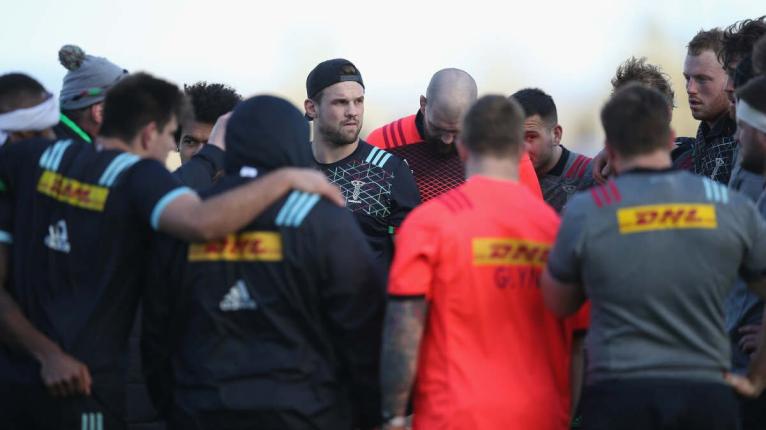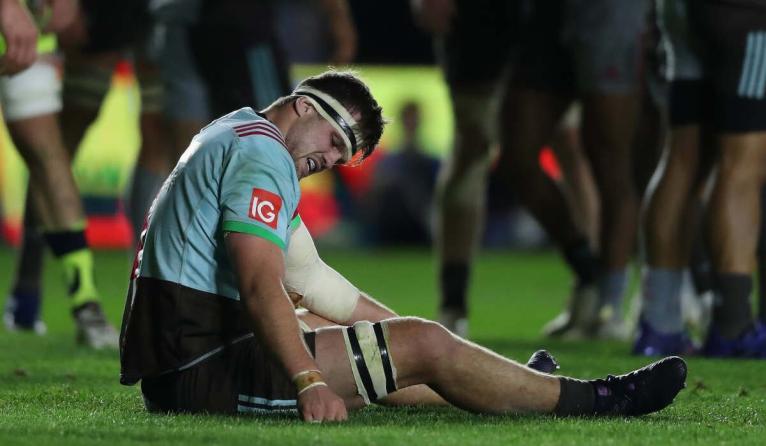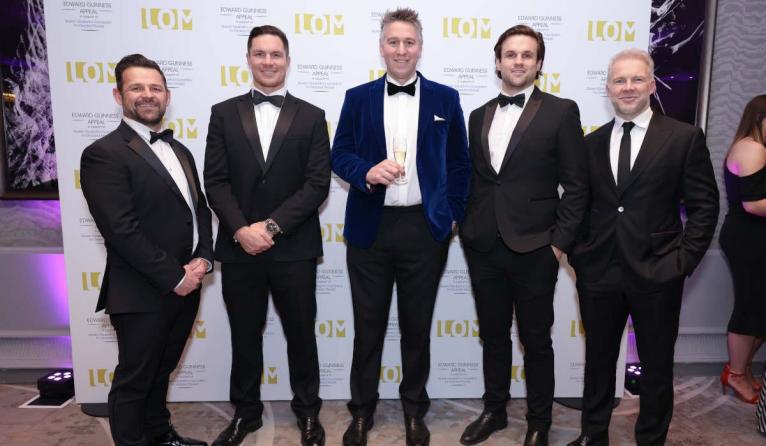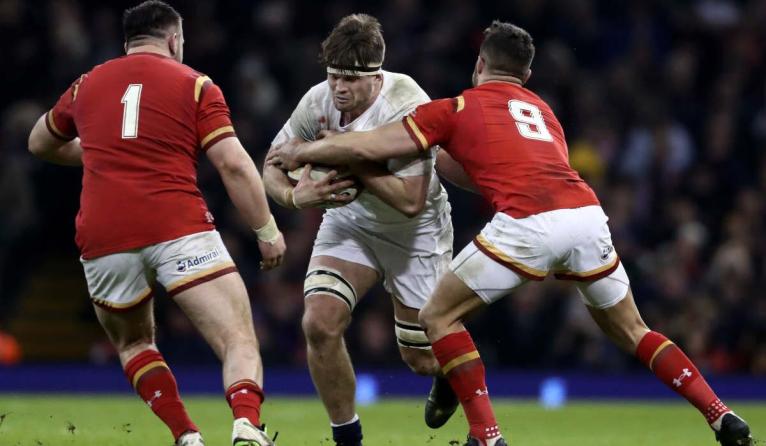At 1.30pm tomorrow, Jack Clifford will not be in the StoneX cheering on his beloved Harlequins. He will be dressed in lycra, feeling the burn, on the first leg of his arduous, eight-day, 750-mile journey between the Premiership grounds, heading to London, via Exeter, for the Wooden Spoon charity, finishing up back at Twickenham for the Premiership final.
Indeed, as Marcus Smith’s kick-off sails into the North London sky, he will snaking south into headwinds with the Angel of the North dominating the vista, with the likes of Lee Mears, Tom May and Al Hargreaves. Had fate dealt him a different card, life could have been so different for Clifford. At 29, he could easily have been packing down with Alex Dombrandt and Stephen Lewies to go toe-to-toe with Ben Earl and Billy Vunipola.
Highly-rated and able to play across the backrow, Clifford had played 100 times for Harlequins, and pulled on the red rose on ten occasions for England, before at 27, he was forced to concede his injury-ravaged body would no longer play ball.
Like so many professionals, he slipped away without fanfare in the height of the pandemic, without even a rapturous Stoop to send him on his way.
This is the thing, no one wants insurance until they need it and when they need it, they become an expert at it
Now working with Gallagher, he is heavily involved in career-ending insurance for players, who are collateral damage life in a contact sport; James ‘Cubby Boi’ Davies, Dan Leavy and Mark Wilson, are three players this season who have joined the likes of Stephen Ferris, Sam Warburton and Liam Squire, in being forced to retire prematurely and not on their terms.
Working in tandem with the RPA on individual policies, Clifford says he totally understands how insurance is nowhere near the top of the priorities list when you’re a player who feels invincible, having the time of your life with similarly-minded players with one common aim; to win rugby matches. “This is the thing, no one wants insurance until they need it and when they need it, they become an expert at it. The reason I know that is I hated paying for it at the start of my career but over time I became an insurance guru. I knew everything there was to know about small print. It can make a huge, huge difference to your life. I got a payout and the money was great, but more than that, what it gave me was time.”

Now nearly two years on from when the dreaded press release went out, Clifford says his experiences have forced him to look at rugby from a different lens. “I’ve had to cut myself off a bit emotionally, I suppose. I don’t want to be ‘that rugby guy’ for the rest of my life. I had a century of caps for Quins and 10 caps for England and don’t get me wrong, I would have loved to play more, but I didn’t get stopped by someone better coming in. I got a surgeon saying, ‘you can’t play anymore’, which is different. I couldn’t play rugby legally and my wife would have left me if I’d said ‘I’m giving it one more go’ because we were buying a house at the time. Otherwise, I’d have no doubt dragged it out to the bitter end. You’d have seen me slugging it out in National Div 2 into my late thirties.”
Indeed, the list of injuries Clifford endured during a near 10-year professional career is how he ended up working in insurance after a chance meeting with former Scotland and Lions lock, Nathan Hines, who worked at Premiership title sponsor, Gallagher. “I think I’d spent about three years of my 10 years on the treatment bench and he said ‘you’re a walking advertisement for career-ending insurance’”.
I’ve had both shoulders reconstructed twice, my hamstrings stuck back on twice, I’ve had both ankles fully reconstructed, five concussions, punctured my lung. I thought it was best to call it a day.
When that final, fateful shoulder injury came, playing against London Irish, Clifford was remarkably sanguine, compared to his other injuries. “When I’d come off before I’d been in tears and mentally broken but with this one, I walked off and I thought, ‘that’s it, I’m done’. It was a sign that my body had finally given up. Mentally, I thought, I want to be able play football with my kids.”
Clifford says the roll call of injuries he had playing makes strangers wince. “Putting my shoulder back together was my eighth surgery. I thought I’m 27, I’ve had both shoulders reconstructed twice, my hamstrings stuck back on twice, I’ve had both ankles fully reconstructed, five concussions, punctured my lung. Reading between the lines, I thought it was best to call it a day.”

When he left and was cast out, blinking into the wide world, Clifford said it was, at first, intimidating. “Honestly, we live in a bubble in rugby. It’s very insular. People say, ‘do you talk to the lads now?’ Well, not a huge amount to be honest. When you’re in that bubble, you’re all pulling in the right direction, but when you’re out of it, it’s very different. If I saw any of the boys tomorrow, I’d grab a beer with them, but often they’re not your lifelong mates, they’re your colleagues.”
There is a hint of remorse at the timing of the end of his career in South-West London at the height of lockdown. There were no bouquets and garlands. No public tears and social clips to look remorsefully back on. “I just kind of left. It was in the middle of the pandemic and Quins were going through a transitionary phase. Honestly, it was all a bit of a mess. All those bits where you hang out as a team, the good bits, were taken out. There was no leaving do. It was all very surreal.”
I would have loved to have won something with them. I played in a European final, but I would have given up the odd England cap for a chance to win a Premiership with my mates.
Even in his playing days Clifford had figured out rugby wasn’t a career for life. Unlike professional football, there is simply not enough money to hit the golf course and buy a pub to while away the years but the 6ft 4in backrow is still routinely asked if he misses the game. “People ask me if I’d like to test myself against Tom Curry or Sam Underhill, and I think, ‘well, no’ my body has given up and they’re much better than me anyway, but I prefer live the dream that I was up there, at my best,” he smiles.
Forever associated with Quins, he says his one regret is not lifting silverware. “I would have loved to have won something with them. I played in a European final, but I would have given up the odd England cap for a chance to win a Premiership with my mates. That would be an amazing feeling. Saying that, I’ve walked away from rugby content with that I’ve achieved.”

As for the semi-final against their London rivals, Saracens, Clifford says to discount Quins would be folly. “You just never know. I went to the Gloucester game at Twickenham with clients. At half-time, we were 24-7 down, and they said, ‘what’s going on, this is dreadful’, so I said, ‘I promise you, I’m not a betting man, but if you’ve got a tenner, I’d put it on’. They said, ‘don’t be daft’, and lo and behold, they came back. You can never write them off. I was buzzing for Quins doing what they did last year. It will be tough against Saracens – I never fared particularly well there – but I can only wish them the best of luck.”
As for advice he’d give players who are on the treatment table, or sitting out the game through concussion, Clifford would recommend networking and working with club sponsors for the day you hope will never come. “When I was rehabbing, I did some work in Sainsbury’s marketing department down in Brighton, I saw how sweetcorn was produced and packaged and I did some insurance stuff with I went into Lloyd’s Brokers with Ascot, a former Quins sponsor. I also got involved with adidas when did their launch for the 2018 Winter Olympics. At the time, I was still playing and thought I’d be having this issue at 32 or 33, so retiring at 27 left me slightly in the lurch.”
You’re at the bottom of the pile. The team hierarchy you were in before completely changes. It’s very humbling. You have to take it on the chin and learn quickly.
Clifford on adapting to civilian life
As for the steps you need to take while supping your coffee with team-mates or gaming with friends, Clifford says most player’s x-factor is their personality. “The first job I was offered was at a ship brokers. I ended up working there for six months but it wasn’t for me. I was sat at a desk doing long hours on the phone, pumping numbers into a computer. I learnt how to cold call, manage my time. It quite a change from what I’d been doing before Gallagher got in touch.”
From the myriad stories we see of players struggling to adapt when on civvy street, one of the most disheartening aspects is starting out a decade after your friends have gone into the workplace, as the thud to earth from being a player lauded for your athletic gifts is keenly felt. “You’re at the bottom of the pile. The team hierarchy you were in before completely changes. It’s very humbling. You have to take it on the chin and learn quickly.”

While he acknowledges that nothing will replace the buzz of playing, knowing he’s helping a fellow professional on his next steps in life after a serious injury does give him purpose. “That’s my philanthropic side. I want to help the lads because I’ve been there. It’s reassuring to be on the other side knowing they will be alright. It’s funny, for GDPR reasons, you can’t tell players if the insurer is going to pay out. I was out for a coffee with a former player a while back and he was saying, so what’s happening, what going on? He was obviously fretting over whether he was going to get a payout or not so I was kinda sitting on my hands thinking, ‘you’ll be okay, you afford to buy me a coffee’. A few days later he phoned and said, ‘woah, yes, I got it’ and I’m thinking, yep, ‘I know’. That side of it is really, really nice.”
No longer hitting tackle bags, running moves or working on his soft skills, Clifford says no day is the same, which he prefers. “One morning I’ll be in the construction industry, the next minute I’m with a football agent. Then in the afternoon, it could be financial services and private equity. You get exposure to different industries you knew nothing about.”
I’d love to see how somehow Danny (Care) makes it into the England squad. I can say that now, as a fan. Let’s not say we’re building for the future. Just pick the best side to win.
Clifford still mixes in rugby circles. Attending the RPA awards earlier this month, he says he chatted to players mulling over their future options. My message is, ‘drop me a message, and we’ll organise drinks. I can introduce you to people in other sectors.’ There’s no such thing as ‘jobs for the boys’ anymore. Of course there’s still a rugby community but employers look at rugby players as having transferrable skills, but it’s knowing how to transfer them, that’s the subtle difference. There’s no such thing as failing, as long as you learn along the way and take something from any situation. It takes some people years to find it out what they want to do.”
After finishing his taxing charity bike ride, he can settle back into his routine, and like many other fans, he has earned the right to sit on his backside to watch England heading Down Under on the summer tour. “I’d love to see how somehow Danny (Care) makes it into the England squad. I can say that now, as a fan. Let’s not say we’re building for the future. Just pick the best side to win. Pick DC at 9, Dommers at 8 and Marcus at 10. Stick March (Joe Marchant) at 13 – no bias at all! You see those post-match interviews, where the skipper says the other side played well and they’re looking forward to the next game, well that’s all bollocks. We want to smash them. I can’t wait.’
A rock star in his pomp, Clifford has proved beyond reasonable doubt that there is life after rugby, if you apply yourself.


Comments
Join free and tell us what you really think!
Sign up for free